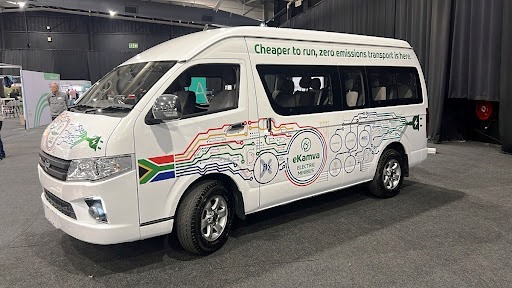South Africa’s Automotive Industry at a Turning Point: Embracing the Electric Revolution
This article discusses President Cyril Ramaphosa's urgent call for the South African automotive industry to proactively transition towards electric and hybrid vehicles in response to global trends and the impending implementation of the European Union’s Carbon Border Adjustment Mechanism (CBAM). It highlights the risks of non-compliance, the opportunities for growth through innovation, and the potential challenges faced by the sector. The article also covers the recent launch of South Africa's first electric minibus taxi, marking a significant milestone in the country's move towards sustainable public transportation
AUTOMOTIVE INNOVATIONS
Arthur
10/18/20243 min read


Ramaphosa Urges South African Auto Industry to Embrace the Electric Revolution Amidst New Electric Taxi Launch
President Cyril Ramaphosa has issued a strong call to the South African automotive industry to proactively join the global shift towards clean energy, warning that failure to adapt could leave the country’s automotive sector lagging behind as the world moves away from combustion engines and carbon-intensive products.
Speaking at the Auto Industry Week conference in Cape Town, Ramaphosa emphasized the urgency of transitioning to electric and hybrid vehicles, noting that this shift is not only about keeping up with international trends but is also crucial for maintaining competitiveness in global markets.
“The global transition towards cleaner, more sustainable fuels is accelerating, with major economies setting stringent emissions regulations,” he said. “South Africa’s automotive sector must act decisively to position itself as a player in this evolving market, or we risk being left out of future trade opportunities.”
The Carbon Border Adjustment Mechanism (CBAM) and its Impact
One of the key regulatory changes facing the global automotive industry is the European Union’s Carbon Border Adjustment Mechanism (CBAM), set to be implemented in 2026. This new regulation will impose taxes on carbon-intensive exports entering the EU, a significant challenge for countries like South Africa, whose exports rely heavily on goods with a high carbon footprint.
The automotive industry, one of South Africa's key export sectors, could face major disruptions if it does not move towards greener technologies. The CBAM could result in South African-made vehicles and automotive components becoming more expensive to export to Europe, reducing the country's competitiveness in the global market.
Ramaphosa’s address at the conference highlighted the importance of reducing the carbon intensity of the country's automotive production to avoid being penalized by the CBAM. He stressed that embracing electric vehicle (EV) production and other sustainable technologies is essential not only for compliance with international regulations but also for long-term economic growth and job creation.
Recent Launch of Electric Minibus Taxi: A Glimpse of the Future?
In line with this push towards cleaner technology, South Africa recently saw the launch of its first electric minibus taxi—a significant development given the country’s heavy reliance on taxis as a primary mode of public transport. The introduction of electric taxis signals a commitment to reducing emissions in the public transportation sector, which has long been a major contributor to the country’s carbon footprint.
The new electric taxi minibuses are not only more environmentally friendly but are also expected to provide cost savings for operators in the long run due to reduced fuel and maintenance costs. However, the initial cost of electric vehicles remains a significant barrier to widespread adoption, with many in the industry calling for government incentives and subsidies to support the transition.
The Future of South Africa’s Automotive Industry
Ramaphosa’s message is clear: the South African automotive industry must evolve rapidly to meet the demands of a changing global economy. He urged industry leaders to invest in research and development for electric vehicles and to work closely with government bodies to create a supportive regulatory framework.
The President also highlighted the importance of local manufacturing of electric vehicles and components, emphasizing the potential for job creation and economic growth. "We must look at this transition as an opportunity to build new industries and create sustainable jobs," he said. "South Africa can and should become a hub for electric vehicle production on the African continent."
With the looming introduction of the CBAM and the global shift towards cleaner transportation, the pressure is on for South Africa’s automotive sector to take bold steps towards the future. The recent launch of electric taxis is a promising start, but the industry will need to accelerate its efforts to avoid being left behind in the global clean energy race.
Challenges and Opportunities
The path to a green automotive industry in South Africa is not without challenges. High costs of electric vehicles, a lack of charging infrastructure, and the country's reliance on coal-powered energy present significant hurdles. However, these challenges also offer opportunities for innovation and investment in renewable energy and infrastructure development.
As the world moves towards decarbonization, South Africa has the potential to play a leading role in the electric vehicle revolution in Africa. The automotive industry, with its strong export base, could leverage this transition to strengthen its position globally—if it acts now.
Ramaphosa’s call to action is timely and necessary. The future of the South African automotive industry depends on its ability to embrace change, innovate, and align itself with global trends. The recent launch of the electric taxi is a step in the right direction, but much more needs to be done to ensure the industry remains competitive and sustainable in the years to come.
Future
© 2025. All rights reserved.


